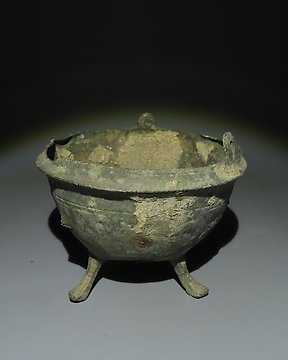
Romersk antik Bronze Beholder. 1.-3. århundrede e.Kr. 8,9 cm i diameter.
Nr. 84275349

Nr. 84275349

Due to custom regulations we can not ship outside the E.U. Please make sure you have an EU shipping address before bidding.
Earrings with Roman green glass beads. The authentic ancient glass beads are restrung with modern materials in a hand-made design with typical ancient spirals.
The single and triple spiral was a popular design in Celtic Greek and Roman culture. Its meaning is not completely clear, but it has been suggested to be linked to birth or rebirth, or that it represents the sun or ethereal radiation energy.
Total length: ± 65,2 mm
Diameter beads: ± 4,55 mm maximum
Diameter spirals: ± 13,7 mm
Good condition and wearable. The ancient beads are restrung and combined with modern gold-plated spacer beads and fittings. Signs of wear consistent with age and use. See images.
Certificate of Authenticity available upon request (pdf-document).
Ancient/Roman beads:
All authentic ancient beads are slightly different in shape or colour shade and show different signs of wear or iridescence. This adds to the charm of each piece and makes every composition unique.
ANCIENT GLASS
Glass has always been found in nature, but the humans first created glass about 4.000 years ago. when ancient craftsmen in Mesopotamia discovered the art of mixing sand, soda and lime to make glass.
For centuries, glass was a luxury item and reserved for the upper classes.
Glassmaking centers around the Mediterranean world experimented with new techniques (casting, core-forming, mosaic glass) and with colours by adding metallic oxides (cobalt, copper, etc) to the mixture.
The Romans learned the glass-making craft after the conquest of Egypt in the 1st century BC. During the 1st century AD the glassblowing technique revolutionized the production and made it possible to produce larger quantities. By adding manganese dioxide Roman glassmakers successfully produced colourless or ‘aqua’ glass for the first time.
Roman glass became a very popular material, used for beads, glass windows, mosaic tiles, tableware pieces etc. Roman glass was traded all over the Roman Empire and far beyond to Central Africa, Scandinavia and via the Silk Route to China.
Sådan køber du hos Catawiki
1. Opdag noget særligt
2. Afgiv det højeste bud
3. Foretag en sikker betaling